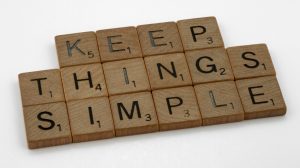A Clear Space for a Healthier Heart:
We all talk about how important it is to declutter and organize. But we all know life gets busy and complicated making it easy for clutter to pile up. Papers on the counter, clothes in a chair, an overflowing closet—before you know it, the mess is adding more stress to your day than you realize. A cluttered space doesn’t just affect how your home looks—it can also weigh heavily on your mental health, your time, and even your safety.
Creating a more organized and clutter-free environment can ease daily stress, save valuable minutes, and remove safety hazards, all of which contribute to a healthier lifestyle. And since stress is directly tied to heart health, clearing out the clutter is more than tidying up—it’s a step toward caring for your heart.
How Clutter Impacts Stress and Heart Health
Stress is one of the hidden contributors to heart disease. When your brain is overloaded by too much visual and physical clutter, it creates mental fatigue and increases stress hormones. Over time, this constant state of stress can affect blood pressure, sleep, and even eating habits—all of which influence heart health.
On top of that, clutter can create physical risks, like tripping hazards or misplaced medications. For those recovering from heart surgery or working on prevention, a safe and calm environment makes it easier to stay on track with routines that matter most.
Decluttering and organizing are not just about a tidy home—they’re about creating a supportive space where you can thrive.
Practical Benefits of Decluttering and Organizing
- Reduces Stress and Overwhelm
A clear space helps you feel calmer and more in control. Even small changes, like organizing a desk or clearing the kitchen counters, can make your day feel lighter. - Improves Safety
Clutter in walkways, on stairs, or near doors can be dangerous. An organized space reduces the risk of falls and accidents, which is especially important after surgery or for those with limited mobility. - Saves Time
When everything has a place, you spend less time searching for keys, bills, or your blood pressure cuff. A few minutes saved each day adds up to more peace of mind. - Supports Healthy Routines
Organization makes it easier to stick to routines that support your heart, like taking medications on time, planning meals, or keeping up with appointments.
Organizing Ideas for a Heart-Healthy Life
1. Medication Management
Taking medications as prescribed is crucial for heart patients and anyone working to manage risk factors like high blood pressure or cholesterol. A little organization goes a long way:
- Use a pill organizer: Weekly or monthly pill boxes make it easy to see if you’ve taken your dose.
- Set reminders: Phone alarms or apps, even timers can help you stay consistent.
- Keep a medication log: Use journals to write down dosage times and side effects to share with your doctor. (Here are my free trackers that cover MEDICATION, DOCTOR and PHYSICAL THERAPY APPOINTMENTS, MEDICAL CONTACTS and PAIN/QUESTIONS DOCUMENTATION.)
2. Calendar Events
Appointments, tests, and daily habits are easier to manage with a system that works for you.
- Digital calendars: Sync your phone with reminders for doctor visits, prescription refills, or exercise.
- Physical calendar: Place one in a high-traffic area like the kitchen to keep the whole household on track. Between wall, desk, and pocket, there’s one to work for you.
- Doctor’s questions list: Keep a small notebook or digital note where you jot down questions as they come to mind, so you’re always prepared and keep it with your calendar so not to forget it at your next appointment.
3. Household Chores
Managing household tasks without feeling overwhelmed is part of maintaining a healthy, stress-free environment.
- Make a rotating schedule: Break chores into daily, weekly, and monthly lists to keep them manageable. Write them all in your calendar.
- Divide tasks: Share chores with family members, so it’s not all on your shoulders. Also, divide the chores so you only have one big one or a couple of manageable small ones a day.
- Declutter as you clean: If you pick up an item you no longer use or love, donate or discard it rather than setting it aside.
Keep Moving Forward With Small Steps of Decluttering and Organizing
Decluttering doesn’t mean tackling your entire house in one weekend. Small, consistent efforts create lasting change. Here are a few simple ways to start:
- Choose one drawer or shelf at a time. Don’t overwhelm yourself—slow progress is still progress.
- Adopt the “one in, one out” rule. For every new item you bring into the home, remove something you no longer need.
- Create “homes” for everyday items. Keys, mail, and health tools (like a blood pressure monitor) should always go back to the same spot with the same type of items.
These steps reduce the stress of searching, keep your environment safe, and give you more energy to focus on heart-healthy habits.
A Clearer Space, A Healthier Mind
Your environment plays a big role in how you feel each day. By decluttering and organizing, you’re not just making your home look nicer—you’re setting up a supportive foundation for better heart health. Whether it’s keeping your medications in order, scheduling regular checkups, or reducing the stress of a messy space, these habits help free your time and energy for the things that matter most.
A tidy home won’t cure heart disease, but it can make your journey toward prevention, recovery, or maintenance much smoother. Each step toward organization is a step toward less stress—and less stress means a healthier heart.
